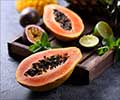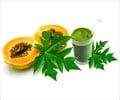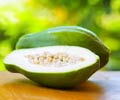- Dengue fever treatment with Carica papaya leaves extracts - (http://www.ncbi.nlm.nih.gov/pmc/articles/pmc3614241/)
What are Papaya Leaves?
Papaya, a fruit that was reputedly called the "fruit of the angels" by Christopher Columbus, comes from a North American tree (Asimina triloba of the family Annonaceae) with purple flowers and an edible yellow fruit.
The whole fruit, as well as other parts of the papaya tree, are beneficial to health in several ways. While the health benefits of the fruit are widely known, it is only in recent times that the healing properties of its flowers and leaves have come to be widely recognized.
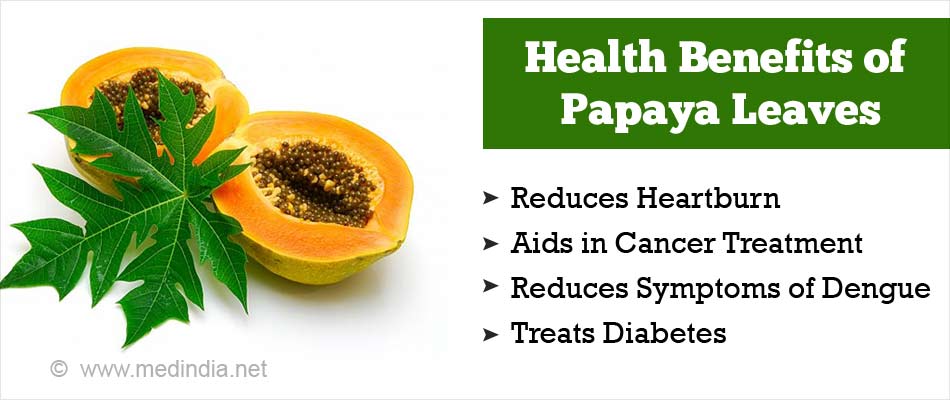
Nutritional Facts of Papaya Leaves
Papaya leaves contain over 50 ingredients, including vitamins (A, B1, C and E), calories, protein, carbohydrates, calcium, phosphorus, iron, potassium, sodium, magnesium, manganese and water. Many research studies have found that the phytonutrient compounds in papaya leaves act in synergy to display a strong antioxidant and immune enhancing impact in the bloodstream. Papain, alkaloids and phenolic compounds are responsible for their positive biological effects.
What are the Health Benefits of Papaya Leaves?
Although papaya leaves purportedly offer a whole host of health benefits, some of the most notable benefits include the following:
- Reduce Heartburn / Digestive Problems - Papaya leaves contain karpain, which kills bacteria that cause problems like gastritis. The leaves reduce inflammation of the stomach lining and heal gastric ulcers by killing H. pylori bacteria. Papaya leaves also contain papain, protease enzyme, and amylase enzyme, which help break down proteins, carbs, and soothes the gastrointestinal (GI ) tract. This also helps relieve the discomfort caused by acid reflux. Papaya leaf tea has also been used to provide relief from colon inflammation that arises as a result of Irritable Bowel Syndrome (IBS) and other inflammatory bowel diseases.

- Aid in Cancer Treatment - In recent times, the papaya leaf is gaining credibility in Western medicine for its anticancer powers, something that tribal folk cultures have recognized for generations. Most cancer therapy regimens have devastating consequences on the body; papaya extract, however, does not have any toxic effects on normal cells. Clinical studies have confirmed that the papaya leaf extract effectively inhibits cancer cell growth and improves immune activity. An article in Journal of Ethnopharmacolgy highlights that the leaf extract can mediate and boost TH1 type cytokines in the immune system, which could help treat and prevent certain types of allergic disorders and cancer. Another study conducted by the University of Florida documents papaya’s dramatic anticancer effect against a broad range of lab-grown tumors, including cancers of the cervix, breast, liver, lung and pancreas.
- Reduce Symptoms of Dengue - Dengue symptoms include fever, headache, muscle and joint pain - and a skin rash that is similar to measles. On rare occasions, the disease progresses into a more threatening condition called dengue hemorrhagic fever. In such cases, the patient experiences bleeding, low platelet count, and blood plasma leakage, or dengue shock syndrome, characterized by dangerously low blood pressure. Though there is no concrete evidence that papaya leaf extract cures dengue, there have been several reports of its medicinal properties helping alleviate various symptoms associated with dengue. The extract is packed with enzymes like chymopapain and papain that help normalize the platelet count, improving the clotting factor and repairing liver damage caused by dengue, thereby aiding in recovery.
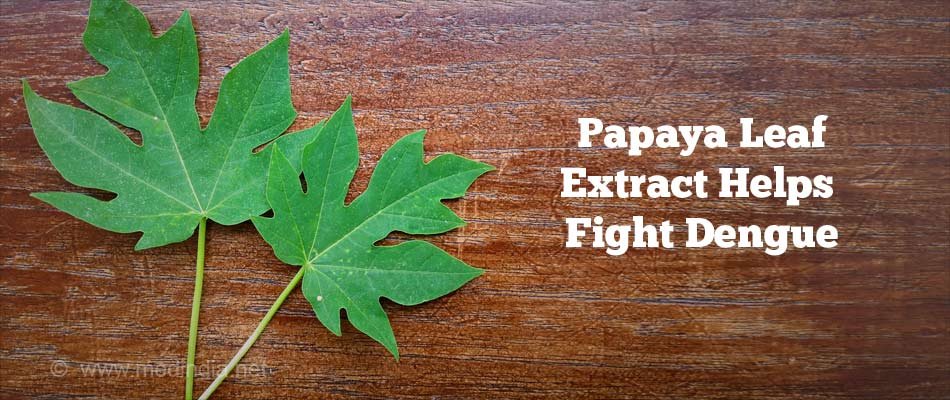
- Relief For Skin Ailments - Skin health is promoted by Vitamins A and C in papaya leaf juice. The content in the leaf is higher than in the fruit. Papaya leaf can be used for a variety of skin conditions including as an antiseptic for infected cuts, to treat ringworm, bed sores, acne, rashes, bug bites, to heal burns, and lots more.
- Useful for Diabetic Patients - Papaya leaves are very useful to patients who suffer from diabetes. Type 2 diabetes is characterized by poor insulin sensitivity due to inefficient glucose uptake by the cells. Most diabetic patients also suffer due to secondary complications arising from fatty liver, kidney damage, oxidative stress, and the compromised process of wound healing. These ill effects can be restricted with the help of papaya leaves due to the mix of antioxidants in the extract.

Papaya Leaves Recipe
Papaya Leaf Tea
- Wash and dry 2 or 3 medium-sized papaya leaves. Shred them.
- Place the shredded leaves in a saucepan and cook in two liters of water.
- Simmer until the water is reduced by half.
- Strain the extract and store in the refrigerator.

